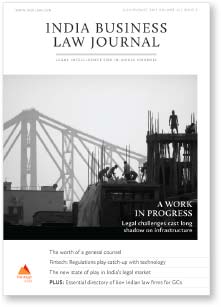The arrival of foreign firms is now a matter of ‘when’, but are we overthinking our concerns?
All eyes are on the Indian government, which has now only to name the moment when international lawyers can do more than provide advice on a fly-in-fly-out basis. This will no doubt be a pivotal moment for the Indian legal market, but how will it play out for clients and the international law firms?

While we can expect some turmoil within Indian firms in the short run, the recalibration that will follow can be expected to produce long-term benefits for both clients of these firms and young lawyers in India who are looking for better opportunities. But, given the sophistication of the operations of international law firms that currently serve clients from offices in Singapore, Hong Kong and further afield, chances are having an office in Mumbai, Delhi or Bengaluru will do little to radically alter the experience for their clients or perhaps even the firm’s revenues from India. The question is whether our expectations from the opening of the market are a little over the top.
This issue’s Cover story looks at the infrastructure sector in India, where regulatory and contract enforcement challenges plague any real progress and projects continue to be high risk. International investors are routinely wooed, but the fact is that most are nervous over the regulatory uncertainty. In addition, public pronouncements have not always translated into changes on the ground. Take for instance public-private partnerships (PPPs), which are seen as the way forward in infrastructure development. Three years ago plans were announced for a rethink on PPPs through the creation of an institution called 3P India, and for a dedicated dispute resolution mechanism for PPP infrastructure projects. Neither has materialized. In addition, as Rupin Pawha, managing partner of Juris Legal, points out, “there is no central PPP legislation, nor is there any standard PPP documentation”.
Be that as it may, the financing of infrastructure projects received a boost recently with business trusts specifically for the sector being given the go-ahead. The first public offering by an infrastructure investment trust in India – that of IRB InvIT Fund – was subscribed 8.57 times.
However, as we detail in this issue’s What’s the deal?, the lawyers and merchant bankers working behind the scenes of this offering were constantly jumping through hoops on account of the regulatory uncertainty that prevailed regarding infrastructure investment trusts. Describing the experience, Shaswata Dutta, a principal associate at J Sagar Associates, which advised on the registration of the trust and the subsequent public offering, says: “The whole process itself was based on trial and error … the law was very unclear”. That they were able to successfully make their way through the thickets of regulation will be comfort to others looking to similarly monetize completed assets.
In The future is fintech – the first part of a special series on technology – we explore how Indian and other Asian businesses are capitalizing on the emerging area of fintech. In both India and China online payment channels have attracted hundreds of millions of users. Our coverage includes input on the implications for the legal industry.
Writing in Vantage point Nitin Mittal, the head of legal and compliance and company secretary at Philips Lighting, says that while the contributions of the general counsel cannot be measured in numbers, their actions enable the company to achieve its objectives and to preserve its values. Companies need to acknowledge that the general counsel is an unsung hero, and to recognize and respect their contribution.
With the needs of general counsel in mind, this issue includes India Business Law Journal’s 10th annual edition of its India Business Law Directory. The directory is accompanied by an editorial analysis of the Indian legal market (India: Open for business?), in which we quote lawyers from a wide array of law firms in India, who helped us to capture the prevailing sentiments within the legal community. On the imminent entry of international law firms, while Shivpriya Nanda, joint managing partner at J Sagar Associates, supports a phased opening of the sector, saying the arrival of international firms “could be both a threat and a fantastic opportunity for Indian firms”, others are not so sure. Srinivas Kotni, managing partner of LEXport – a much smaller firm – sees it as “the biggest threat to the existing law firms” as they have miles to go to catch up with their international counterparts. The problem as he sees it is the legal education system in India, which is not up to the task of producing law graduates who can match the quality of their international counterparts.
Will the entry of international firms trigger change in legal education? Perhaps, but that may be more than can be expected.



























